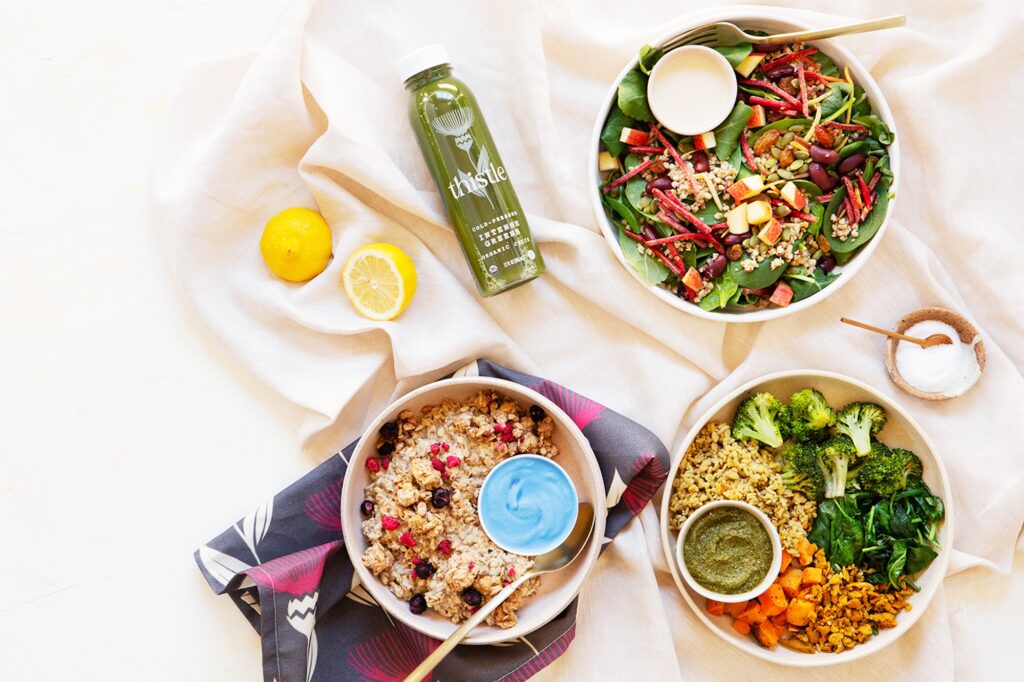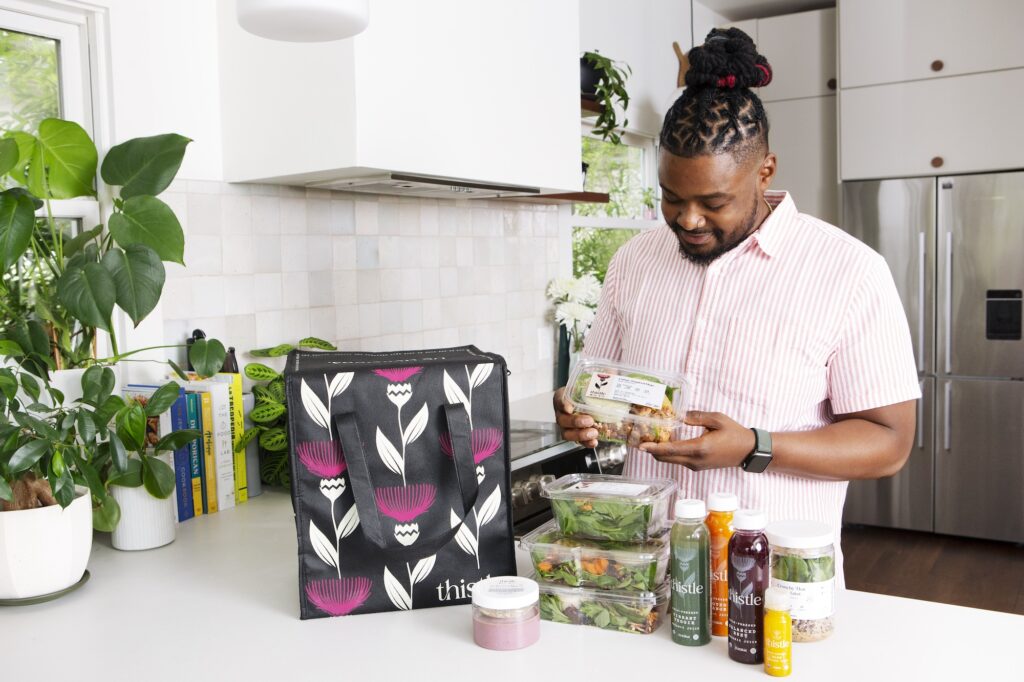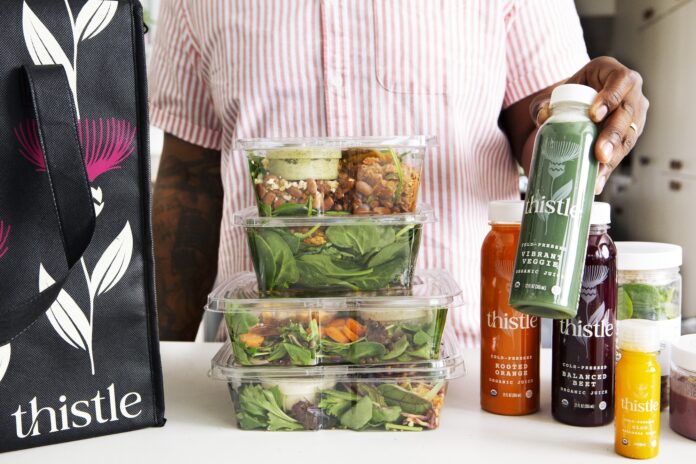Meal delivery kit service company Thistle is on a mission to tackle climate change, food waste, and the global health crisis with a simple focus on plant-forward eating.
Believe it or not, meal delivery kits and services are nearly two decades old. The concept — shipping either fully prepared fresh meals or meal ingredients and recipes to be finished at home — was born in Sweden in 2007. What followed has become a booming industry led by giants like Blue Apron, Green Chef, Hungryroot, Daily Harvest, and Purple Carrot; valued at $20 billion in 2022, the meal kit market is poised to reach $65 billion by 2030, according to recent estimates. With a range of preparation levels, cuisine styles, and options for all dietary preferences, these meal delivery services aren’t just a convenient shortcut for the cooking adverse. They’re not restaurant food, either. Instead, they offer significant health and planetary benefits — critical considerations as the global food system’s contributions to climate change and skyrocketing rates of diet-related health issues can no longer be ignored.
It’s safe to say that dietary changes are crucial. “A growing awareness among consumers of the devastating health and environmental impacts of meat-centric diets has fueled the rise of flexitarianism, which allows people to reduce their meat and dairy intake without entirely eliminating it, and reap many of the benefits of a plant-based diet without making sacrifices they feel they can’t live with,” Shiri Avnery, co-founder and president of meal delivery program Thistle, told Ethos via email. Reducing meat and dairy consumption is a focus for the popular meal service. This approach not only cuts emissions, but also frees up land and resources for more sustainable food production.

Research shows that even small dietary changes can make a big difference for both individual and planetary health. One recent study found that swapping red and processed meat for plant protein a couple of times a week could increase individual life expectancy and reduce dietary carbon footprints by 25 percent, Avnery says. Another recent study found that if U.S. consumers swapped beef for beans, “this could get us approximately halfway to our greenhouse gas reduction goals,” she says.
Thistle meal delivery service
Avnery launched the California-based Thistle in 2013 to address the growing demand for nutritious, plant-based meals that are both accessible and convenient for busy consumers who want to make healthier, more sustainable choices. Thistle’s fresh, healthy plant-forward meals are delivered with minimal to no prep required (typically nothing more than adding a sauce or heating) — significantly reducing food waste. The meals are crafted using organic and local ingredients whenever possible, underscoring the company’s commitment to sustainability. Avnery’s vision extends beyond mere meal preparation, though. It includes the broader objective of minimizing the carbon footprint associated with meal deliveries. Thistle’s operational model incorporates eco-friendly packaging and a streamlined delivery process to further reduce its environmental impact.
But for Thistle, the biggest impact it can have is through its focus on plants. Avnery says plant-based diets appeal to budget-conscious consumers given the affordability and versatility of ingredients that form the foundation of these meals. A recent study found that people who adhere to a vegan diet have a 16 percent lower grocery bill than meat and dairy eaters, saving more than $500 a year. The savings on meat and dairy are more than offsetting increased spending on vegetables, fruits, legumes, whole grains, and plant-based meat and dairy alternatives. “This has been especially true during the inflationary period we’ve lived over the past few years, with the cost of meat, milk, and eggs soaring more than the general rate of inflation for groceries overall while plant-based staples like produce, beans, and bread experienced lower inflation than average,” says Avnery.
We’re witnessing a paradigm shift.
-Shiri Avnery
“Additionally, you don’t have to spend a lot on exotic or novelty ingredients to make plant-based cuisine taste great,” Avnery says. She says the goal at Thistle is to make plants “irresistible” to show that healthy, plant-forward meals can be “a celebration, not a sacrifice.” While its focus is on plant-based food, Avnery says Thistle — like many of its customers — takes a flexitarian approach. “All or nothing approaches can be difficult to stick with, and especially for something as deeply personal as food, the flexitarian approach offers approachability and inclusivity — allowing consumers to make small but impactful changes to their diet to improve their own health and that of the planet.” She says Thistle is seeing flexitarianism on the rise within its customer base, “though most of the meals we serve are plant-based, less than ten percent of our customers identify as vegans or vegetarians.”
Thistle has found its footing as a reliable source for adhering to a consistently balanced diet — something most Americans still struggle to prioritize. “We’re witnessing a paradigm shift where consumers and healthcare providers are increasingly turning to food as a means to prevent and manage health conditions,” Avnery says. She says many food businesses are starting to work with healthcare providers to prescribe healthy meal delivery services to patients, and public-private partnerships are developing to support and scale food-as-medicine interventions across the country — including Thistle. “We are in a few food-as-medicine pilots with healthcare providers,” she says. Thistle is also in a multi-stakeholder strategic partnership with Solano County, California, to explore ways to scale food-as-medicine solutions for those most in need.

Thistle has recently joined the ranks of food brands supporting research into healthier diets. Beyond Meat has worked with the American Heart Association on its products, and the U.K.-based Quorn has backed numerous studies into mycoprotein’s benefits. Thistle recently participated in a UC Irvine study that looked at the impact of plant-based diets on gut health. The study found people who consumed ten Thistle meals per week as part of a high-fiber diet saw drastic gut health improvements in just two weeks, says Avnery. “Research continues to document the intricate connection between the gut and brain and its impact on everything from digestive function, disease prevention, mental health, cognition, and sleep,” she says.
“Whole food, nutrient-dense meals featuring leafy greens and a rainbow of veggies, fruits, whole grains, nuts, and seeds are gaining popularity because they are rich in fiber, antioxidants, and phytonutrients that support gut health and reduce inflammation,” Avnery says. Thistle is also seeing an increase in demand for meals that contain functional ingredients, like kimchi and miso and other fermented foods, omega-3-rich ingredients like seaweed, chia, and flax seeds, as well as adaptogens and medicinal plants like turmeric and ginger. “Also important is what is being excluded from meals to promote digestive health and anti-inflammation: refined carbohydrates, added sugars, preservatives, artificial ingredients, fried foods, and red and processed meat,” Avnery says.
Healthy food for longevity
Many of these checkboxes are built-in for the more conscious Millennials and Gen Z, but just as Gen X and Boomers are driving circular fashion and other sustainable sectors, they’re also driving demand for longevity-focused foods like meals that reduce sugar, fat, and sodium. “As the food as medicine trend and demand for health-promoting meals continues to grow, food developers are working more directly with nutritionists and registered dietitians,” says Avnery. Thistle has a registered dietitian with a culinary background on its innovation team to help ensure a standard of nutrition. Transparency is key, says Avnery, and providing nutritional information and nutritional content highlighting products’ health-promoting benefits will be critical to empowering consumers to make informed choices. “Clinically proven results and doctor/nutritionist recommended products will also be important points of differentiation,” she says.

All of this points to the increased need for personalized nutrition that takes into account an individual’s unique physiological makeup, lifestyle factors, and health goals to tailor dietary recommendations and meal plans specifically to their needs. “It purports that one-size-fits-all dietary advice may not be suitable for everyone and that personalized recommendations can lead to better health outcomes,” says Avnery. This offers an opportunity for food businesses to drive greater connection, engagement, and health outcomes for their customers, but there are challenges, too, like scaling — it becomes increasingly operationally complex to produce individually customized products at the mass scale currently favored by the globalized food system.
Avnery says as more research demonstrates the positive health outcomes and economic benefits of these personalized programs, demand will grow for high-quality, healthy meals that help prevent or treat health conditions — without sacrificing quality or taste. And, she says, we’ll see both growth in demand for nutrition solutions based on individual biometrics, as well as the need for scaling solutions based on generalized dietary guidance in order to improve health outcomes “for as many as possible, as affordably as possible.” As rates of diet-related disease rise and our planet continues to warm, Avnery says consumers will continue to gravitate toward solutions that offer delicious, convenient nutrition “while aligning with their values and sustainability goals.”
Related on Ethos:


